[Updated Oct 2020] A guide to serviced offices and office space for rent in Rio de Janeiro as well as general information that may be useful if you are thinking of renting office space in the city.
For further offices information or to search office space for rent in Rio de Janeiro just click. Or contact us for any other office space query.
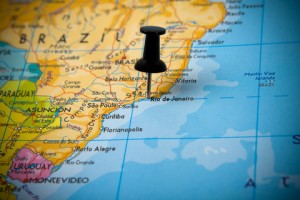
River of January
Found along the south-east coast of South America, Rio de Janeiro is the second-most populous city in Brazil. Its name translates to mean the River of January and it is a hugely popular tourist destination, thanks partly to iconic landmarks like the ‘Christ the Redeemer’ statue and its reputation as one of the party capitals of the world.
Like so many modern cities, Rio was founded as a result of its favourable geographical location, with the Guanabara Bay deemed to offer an ideal place to found a city by imperial Portuguese forces in the mid-16th century. The bay offered a worthwhile strategic stronghold as the Portuguese dealt harshly with both local inhabitants and marauding European pirates over the course of the next two hundred years or so.
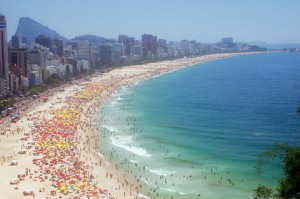
The name River of January refers to the month in which Gaspar de Lemos and his fleet first came across the Guanabara Bay in 1505 and the site was initially dedicated to the venerable Saint Sebastian. The population and utilisation of the site grew dramatically towards the end of the 1600s as ever more valuable resources were being discovered inland and Rio became the principal port along the Atlantic coast of South America.
The Empire and the capital city of Brazil
The Portuguese were to remain the dominant force in what we now call Brazil for hundreds of years and the inhabitants of Rio still speak their language today. Until the early 1800s, the city was the capital of a colonised country that was primarily used to service the royal family and the economy of Portugal, a relatively small European nation thousands of miles to the east. However, the upper classes of the old country found themselves fleeing Napoleon’s advancing armies in around 1808. Prince Pedro I eventually declared Rio as the capital of a newly independent Empire of Brazil in 1822.
As a result of the chronic disruptions in Europe and the links between Portugal, South America and the international slave trade, Rio soon became a city filling up with people originally from all over the world and with very different reasons for finding themselves in Guanabara Bay. To this day the ethnic and cultural mix in Rio is vast and it has helped to engender a quite unique identity.
Rio was originally established as the capital of Brazil while still being ruled directly by Europeans. It continued as such after the Portuguese royals were deposed and the country became a republic in the late 19th century. At this time only a few areas of the city were properly developed but a great deal of investment and activity was to take place throughout much of the 1900s. New areas of the city became increasingly vibrant and it grew into a more glamorous and internationally recognisable destination.
Brasilia and the Rio Zones
In one of the most unusual steps ever taken by a leader of a South American country, Juscelino Kubitschek upheld his promise of building a new Brazilian capital city if he were elected in president 1955. The remarkably ambitious project was made possible by a booming national economy, led to a large extent by activities in Rio. Still the Brazilian capital, Brasilia was built on a plateau in the centre of the country, where the government and the central bank are now to be found.
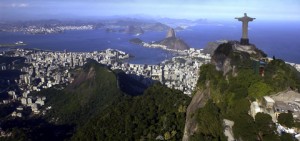
No longer the capital but still a vital part of the Brazilian economy, Rio has become known as one of the most interesting, unusual and important cities in South America. Part of what gives Rio its unique appeal is the layout of the city, with its four primary zones – north, south, west and ‘Centro’.
Economy
Sao Paulo takes the title of being the largest and most economically active city in Brazil but Rio is rated second in almost every measure and is a considerable contributor to the country’s ongoing economic growth. Only Rio’s giant neighbour to the west can claim a stronger industrial, finance or services sector in Brazil and the city has long been home to some of the largest natural resources and mining businesses on the continent.
A huge number of companies and state organisations have their headquarters in Rio and it is a major player in the textiles, pharmaceuticals, publishing, broadcasting and chemicals industries. Entertainment and tourism are also crucial aspects of the local economy, while recent years have seen the transformation of the central business district into a more internationally integrated and orientated economic centre.
Office space to rent in Rio de Janeiro
There are dozens of high-rise buildings offering office space to rent in Rio de Janeiro and the city’s commercial property sector has been achieving notable levels of activity in recent months. With the national economy growing at an impressive rate and economies in the northern hemisphere struggling since the financial crisis, the city’s office space has become the most expensive anywhere in the Americas, according to a report from Cushman & Wakefield. Typical rents are not yet at the level of those in Hong Kong or London’s West End but they increased by as much as 47 per cent in 2010 and now stand at around $1,321 per square metre.
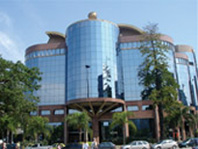
The Brazilian economy grew by a full 7.5 per cent in 2010 and more and more multi-national operators are looking to the South American powerhouse as an important place to do business.
Transport
Wherever you are in Rio you’re likely to have an imposing view of the local hillsides and some sandy beaches, and if you choose to drive your own car then you might have to get used to it. Traffic jams are a common feature of the city and there are perhaps more advisable ways of getting around. Among them is the Metro network, where efforts have and are being made to improve the service that covers the major zones and carries millions of passengers across the city each week.
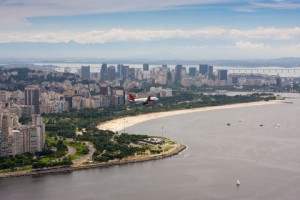
Taxis offer a fair if a sometimes sporadic way of getting around, while the ferry cuts across the Guanabara Bay and the Galeao Airport links Rio with both international and domestic locations. Perhaps the most crucial highway link runs between Rio and Sao Paulo, which lies a few hundred kilometres along the coast.
Tourism and sport
Rio has long been an iconic tourist destination and it is one of the most visited hotspots in the world. Part of the allure for millions of foreign tourists is the city’s reputation as a fun-loving, beach-dwelling party town. A reputation that the locals do their best to live up to with more festivals, carnivals and celebrations going on along the streets and sandy beaches in Rio than anywhere else on earth. Highlights include the new year festivities and the incredible spectacle of the Rio Carnival, a Catholic celebration like no other.
Having given the world some of its greatest ever football players like Ronaldo and Garrincha, among others, as well as some of its best-supported teams, Rio is already recognised for its considerable sporting contributions. However, it will soon take a couple of giant leaps forward in this context because it is to host both the Olympic Games in 2016 and a string of games in the Fifa World Cup of 2014.
We carry out a free office space search and our advisory and acquisition services are also free, always. Our Rio de Janeiro office space brokers and agents are globally regulated by the Royal Institution of Chartered Surveyors (RICS) ensuring the highest standards of commercial property advice and service at all times. We look forward to helping you find the best office space for rent for your business.

The Office Providers are Regulated by the Royal Institution of Chartered Surveyors (RICS)